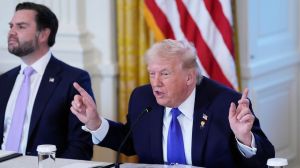An embrace too ardent
Winston Churchill once called on the British-American relationship to 8220;roll on full flood, inexorable, irresistible and benignant.148...

Winston Churchill once called on the British-American relationship to 8220;roll on full flood, inexorable, irresistible and benignant.8221; Whatever the wisdom of Churchill8217;s advice, our admirable strategists are falling head over heels to give similar advice to India. Skepticism about rolling on full flood is dismissed as old fashioned or an aspersion on the government8217;s patriotism. Few deny that India would gain immensely from a close engagement with the United States. The sheer momentum of economic and social links will ensure a substantial measure of cooperation. But it will be fatal if the allure of aligning to US political and military objectives becomes irresistible. It will certainly not be benign. There is some truth to the claim that nothing in our current commitments seriously jeopardises our independence. But equally, it has to be admitted that the discourse on Indo-US relations, as a signal of our political intent and identity, is taking an alarmingly Panglossian view of how American and Indian interests align.
Notwithstanding the current bonhomie, at least ten questions need to be asked more pointedly. India and the US allegedly converge on combating terrorism and promoting democracy. But this shared objective is, at best, an abstraction; at worst, misleading. What is the US track record of building democracies outside of Europe and Japan? Even in its new incarnation, the prospects of American methods promoting democracy are bleak. Iraq is experiencing civil war, and the Taliban has once again become resurgent in Afghanistan. Not moralistic qualms about intervention, but prudence demands that we recognise that America will exacerbate the challenge of building democracy, not solve it.
The same applies to terrorism. A genuine partnership is possible only if India is given a significant role in shaping the long-term global political strategy to deal with terrorism. But what is the US8217;s version of partnership? 8220;We have decided on a strategy for dealing with terrorism: that strategy is on display in Iraq, Pakistan and Afghanistan. We brook no disagreement, do not care for its political consequences and will certainly never admit that this strategy can produce an alarming blowback.8221; India needs to be tough on terrorism. But our political strategies will be different from those of the US. Much of our terrorism problem is rooted in the histories and geo-politics of our region. The anti-western, apocalyptic strain of terrorism has at best been a marginal phenomenon on the sub-continent. Is it in our interest to align with the US and give terrorism ideological and political succour? We can criticise our anti-terrorism strategy on many counts. But it will be an illusion to think that we can afford to combat it by American methods.
Three, India wants to help shape a new nuclear non-proliferation order but isn8217;t it astonishing that we want to sign on to cooperation in this area without clearly ascertaining what kind of non-proliferation regime the US wants? How onerous will be the restrictions on us? The US not only watched, but abetted, the subversion of the last non-proliferation regime. Its own objectives, from Iran to Pakistan, are thoroughly confused. Let us clarify our own objectives rather than partner the US in its confusion. Four, the US has commited to facilitate civilian nuclear cooperation. But this is still a promissory note and the immediate benefits from that cooperation are still pretty slim. The objective constraints on the Bush Administration are too severe to be relaxed any time soon. Doesn8217;t focusing on civilian nuclear cooperation with the US deflect us from pursuing a path that makes us more self-reliant?
Five, there is something myopic about India trying to position itself in American plans for containing China. Isn8217;t it in our best interests to keep out of the emerging Sino-American rivalry, so that India does not become a frontline state in this power game? Of course, no one expects this rivalry to be akin to the Cold War, but that is more reason rather than less to keep all your options open. Even if our military engagement with the US is not deep, just being counted as amongst its allies, our generals standing with its staff, entails serious political costs for our standing in the world. For all its faults, India8217;s great virtue was to not let itself become a frontline state during the Cold War. It should now retain the capacity to not be identified as crudely partisan in world politics, to stay out of the conflicts the US is generating and sustaining.
Six, in one profound sense, the India-Pakistan hyphen has been broken. The US has acknowledged India as a qualitatively different kind of power. But two core elements of the hyphenation persist. The US will encourage Pakistan to tailgate India on everything from technology transfers to weapons systems. The illusion that the hyphen has been broken is sustained because at the moment Indo-Pak relations are improving, so the US8217;s choice of allegiances has not been tested. It would be great if the circumstances under which they would be tested do not arise; but it is still too premature to conclude that the US will make the right choice.
Seven, the interests of the US and India do not converge on the shape of international institutions ranging from the UN to an Asian Monetary Union. Eight, they do not converge in the approach we have to our region. There is talk in Washington of imposing sanctions on companies doing business with Iran. One does not have to condone the Iranians to recognise that US tactics will only make things worse. The US consistently wants to subvert the natural geography of Asia and deny us the power of creating the links we need. Does this fit in with our strategic objectives? Nine, every single power that the US has helped to build up, from Germany to Japan, lost its capacity for independent political and military action. China engaged with the US, but entirely on its own terms.
Finally, the scepticism about the US does not come from, as critics allege, an old mindset, paranoiac about the US. It comes, instead, from confidence in our strength, and a sense that we overestimate US power. By embracing the US as ardently as we are, we are giving up our bargaining chips too soon. We are letting the US set the terms of this relationship more than is warranted. India should become a different kind of great power, not one that orients itself to endorsement by the United States.
- 01
- 02
- 03
- 04
- 05































